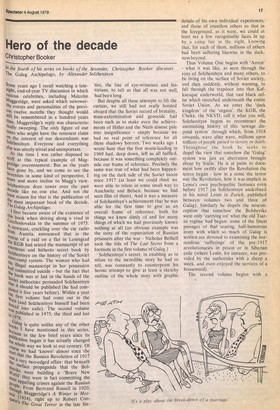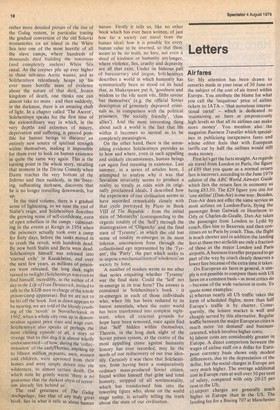Hero of the decade
Christopher Booker
Some years ago I recall watching a latenight, end-of-year TV discussion in which various celebrities, including Malcolm IVIuggeridge, were asked which newsworthy events and personalities of the previ nus twelve months they thought would Still be remembered in a hundred years iLifle Muggeridge's reply was characterist'cally sweeping. The only figure of our titnes who might have the remotest claim ett,n, the interest of our descendants was .301zhenitsyn. Everyone and everything else was utterly trivial and unimportant. At the time I was rather disposed to scoff at this typical example of Mug ridge overstatement. But as the years gone by, and we come to see the 'eventies in some kind of perspective, I Mnre and more incline to Mugg's view. Solzhenitsyn does tower over the past eeade like no one else. And not the fteLast reason for that is the publication of ,tule most important book of the decade, 'ne Gulag Archipelago. I first became aware of the existence of ,this book when driving along a road in `2eehoslovakia in the summer of 1973. newscast, crackling over the car radio ,..1.°111. Austria, announced that in the -th°11rse of a raid on a flat in Leningrad KGB had seized the manuscript of an ille;n1lous and hitherto secret book by 51'411enitsyn on the history of the Soviet th4ve'eamp system. The woman who had illegal manuscript in her possession ti7 committed suicide but the fact that soe,b0ok was at last in the hands of the th,P,Iet authorities persuaded Solzhenitsyn should be published (he had corntt'h'eted it five years before). Within a year W`le first volume had come out in the foest (and Solzhenitsyn himself had been wnreed into exile). The second volume I•n 1978. 4 Published in 1975, the third and last boGni,ulag is quite unlike any of the other be'o's have mentioned in this series, ause in the few brief years since its tPh4ehlieation began it has actually changed courWhnle way we look at our century. Of star-se we had 'known' almost since the vva t that the Russian Revolution of 1917 the s a very two-edged affair: that beneath shevs,.urface propaganda that the BolW0:1''s were building a 'Brave New ts05; they were in fact committing the peo iaPPalling crimes against the Russian tlirePhIe. From Bertrand Russell in 1920, Cow '13„h Muggeridge's A Winter in Mosqtiesti934), right up to Robert Con -8 'The Great Terror in the late Six ties, the line of eye-witnesses and historians, to tell us that all was not well, had been long.
But despite all these attempts to lift the curtain, we still had not really hoisted aboard that the Soviet record of brutality, mass-extermination and genocide had been such as to make even the achievements of Hitler and the Nazis almost pale into insignificance simply because we had no real point of reference for all these shadowy horrors. Two weeks ago 1 wrote here that the first moon-landing in 1969 had, deep down, left us all baffled, because it was something completely outside our frame of reference, Precisely the same was true of what had been happening on the dark side of the Soviet moon since 1917 (at least we could think we were able to relate in some small way to Auschwitz and Belsen, because we had seen film of them). And it was a measure of Solzhenitsyn's achievement that he was able for the first time to give us an overall frame of reference, both for things we knew dimly of and for many things of which we had previously known nothing at all (an obvious example was the story of the repatriation of Russian prisoners after the war Nicholas Bethel' took the title of The Last Secret from a footnote in the first volume of Gulag.) Solzhenitsyn's secret, in enabling us to relate to the incredible story he had to tell, was constantly to counterpoint his heroic attempt to give at least a sketchy outline of the whole story with graphic details of his own individual experiences, and those of countless others so that in the foreground, as it were, we could at least see a few recognisable faces lit up by a camp fire in the night, knowing that, for each of them, millions of others had been suffering likewise in the darkness beyond.
Thus Volume One begins with 'Arrest' what it was like, as seen through the eyes of Solzhenitsyn and many others, to be living on the surface of Soviet society, and then suddenly, without warning, to fall through the trapdoor into that Kafkaesque underworld, that vast black cellar which stretched underneath the entire Soviet Union. As we enter the 'dark kingdom' of the 'organ?, the KGB, the Cheka, the NKVD, call it what you will, Solzhenitysn begins to reconstruct the astonishing history of this 'sewage disposal system' through which, from 1918 onwards, wave after wave, millions upon millions of people passed to slavery or death. Throughout the book he see ks to dispel the view that somehow the 'Gulag' system was just an aberration brought about by Stalin. He is at pains to document how swiftly after the Revolution the terror began how in a sense the terror was the Revolution, how it was implicit in Lenin's own psychopathic fantasies even before 1917 (as Solzhenitsyn underlined in his novel Lenin in Zurich, published between volumes two and three of Gulag). Similarly he dispels the misconception that somehow the Bolsheviks were only 'carrying on' what the old Tsarist regime had begun: some of the finest passages of that searing, half-humorous irony with which so much of Gulag is written are devoted to examining the hor rendous 'sufferings' . of the pre-I917 revolutionaries in prison or in Siberian exile (where Lenin, for instance, was pro vided by the authorities with a sheep a week, and even enjoyed the services of a housemaid).
The second volume begins with a rather more detailed picture of the rise of the Gulag system, in particular tracing the gradual conversion of the old Solovki monasteries on an island in the White Sea into one of the most horrific of all the slave camps, where hundreds of thousands died building the notorious (and completely useless) White Sea canal. As the corpses pile up ever higher in those sub-zero Arctic wastes, and as Solzhenitsyn relentlessly heaps up his ever more horrific mass of evidence about the nature of that dark, frozen kingdom of death, one thinks one can almost take no more and then suddenly, in the darkness, there is an amazing shaft of light, In a chapter called The Ascent', Solzhenitsyn speaks for the first time of the extraordinary way in which, in the very depths and extremes of misery, deprivation and suffering, it proved possible for human beings to discover an entirely new source of spiritual strength within themselves, making it impossible for them ever to look on human existence in quite the same way again. This is the turning point in the whole story, recalling that moment in the Divine Comedy when Dante reaches the very bottom of the Inferno and then suddenly, in the freezing, suffocating darkness, discovers that he is no longer travelling downwards, but up.
In the third volume, there is a gradual sense of lightening, as we near the end of Stalin's reign, and Solzhenitsyn describes the growing sense of self-confidence, even of open rebellion in the camps culminating in the events at Kengir in 1954 when the prisoners actually took over a camp for forty days, before the tanks moved in to crush the revolt, with hundreds dead. By now both Stalin and Beria were dead. Solzhenitsyn himself was released into 'eternal exile' in Kazakhstan, and over the next few years, as millions of prisoners were released, the long dark night turned to twilight (Solzhenitsyn waseven to find himself, incredibly, as the author of A day in the Life of Ivan Denisovich, invited to talk to the KGB men in charge of the whole prison-camp apparatus). But we are not to be let off the hook. Just as dawn appears to be nearing, we are told of the bloody crushing of the 'revolt' in Novocherkassk in 1962, when a whole city rose up in demonstration against price rises and wage cuts. Solzhenitsyn also speaks of perhaps the most chilling episode of all, a story so strange that to this day, it is almost wholly undocumented — of how,.during the 'collectivisation' of the earlyThirties, anything up to fifteen million _peasants, men, women and children, were uprooted from their homes and were simply driven into the wilderness, to almost certain death. On which note he grimly warns 'there is no guarantee that the darkest abyss of terrorism already lies behind us'.
The real greatness of The Gulag Archipelago, like that of any truly great book, lies in what it tells us about human nature. Firstly it tells us, like no other book which has ever been written, of just how far a society can travel from the human ideal; how it is possible for every human value to be inverted, so that there seems to be no truth, no love, not even a shred of kindness or humanity any longer, where violence, lies, cruelty and depravity are all that exist. Under its hideous pall of bureaucracy and jargon, Solzhenitsyn describes a world in which humanity has systematically been so stood on its head that, as Shakespeare put it, 'goodness and wisdom to the vile seem vile, filths savour but themselves' (e.g. the official Soviet description of genuinely depraved criminals as, in comparison with the political prisoners, 'the socially friendly', 'class allies'). And the most interesting thing about such a world is the fact that life within it becomes so surreal as to be completely meaningless.
On the other hand, there is the astonishing evidence Solzhenitsyn provides as to how and where, even in such appalling and unlikely circumstances, human beings can again find meaning in existence. Last summer, in a series of articles here, I attempted to analyse why it was that Socialism invariably seems to produce a reality so totally at odds with its originally proclaimed ideals. I described how the experience of our civilisation seems to have accorded remarkably closely with that cycle portrayed by Plato in Book VIII of The Republic from the initial state of 'Monarchy' (corresponding to the organic totality of the 'Self') through the disintegration of 'Oligarchy' and the final state of 'Tyranny', in which the old lost sense of totality re-emerges in its most inferior, unconscious form through the collectivised ego represented by the 'Tyrant', the 'Party', the part which seeks to re-impose a mechanical form of 'wholeness' on society by force.
A number of readers wrote to me after that series enquiring whether 'Tyranny' was the final state. Could the 'Self' not re-emerge in its true form? The answer is contained in Solzhenitsyn's book it re-emerges in each of those individuals who, when life has been reduced to its barest essentials, when the outer world has been transformed into complete nightmare, when all external grounds for hope have been removed, once again find that 'Self hidden within themselves. Therein, in the long dark night of the Soviet prison system, at the centre of the most appalling crime against humanity history has ever recorded, may lie the seeds of our rediscovery of our true identity. Certainly it was there that Solzhenitsyn, from having been a comparatively ordinary mass-produced Soviet citizen, found within himself that grim and total honesty, stripped of all sentimentality, which has transformed him into the towering figure who, alone on the world stage today, is actually telling the truth about the state of our civilisation.



































 Previous page
Previous page